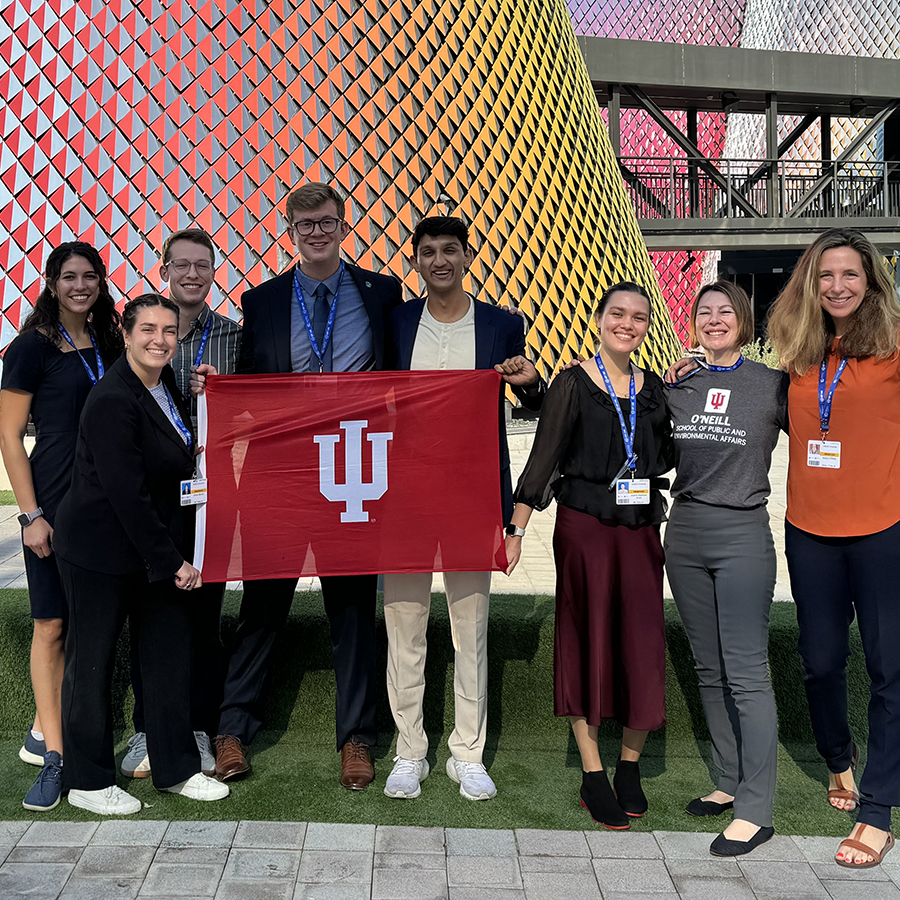BLOOMINGTON, Ind. - Global climate change is one of the largest threats facing our world, and working together to combat this critical issue will be paramount to overcoming the challenge.
That very notion is what brought together nearly 100,000 attendees at COP28, the United Nations Climate Change Conference of the Parties of the UNFCC held in Dubai, United Arab Emirates Nov. 30-Dec. 12. Among the attendees were high-profile world leaders and a host of experts in the public, private, and academic sectors, including representatives from the Paul H. O’Neill School of Public and Environmental Affairs.
Led by Dean Siân Mooney, the O’Neill contingent also featured both undergraduate and graduate students, making IU one of the few universities in the world to send students as observers to the event.
“COP28 was informative, thought-provoking, and, at times, very overwhelming,” Mooney said. “There were multiple, simultaneous events running from 8 a.m. to 8 p.m., and it was—as you might expect—a very international experience with people from all over the world coming to talk about their future and the future of the climate.”
O’Neill student participation was generously supported by Kelly Johnson, an O’Neill alum and Dean’s Council Member.
“During my time working in the federal government, I was fortunate to represent the United States at United Nations global conferences on sustainability and world heritage,” Johnson said. “These were some of my most memorable experiences as the opportunity to interact with world leaders on pressing international issues was unsurpassed. For the O’Neill students who attended COP-28, I wanted them to share the excitement of being part of the global community as they embark on their careers. I hope they, too, found it to be unforgettable.”
Mooney attended some of the informal negotiation sessions. There, she saw the challenges of crafting policy that can combat climate change as each representative focused on the needs of the individuals charged with representing their country’s constituents.
“As in many other negotiations, it is impossible to fully satisfy all parties, so many compromises are made on a daily basis,” Mooney said. “The president of the COP has a significant responsibility to move the negotiations along. Often when things were ‘quiet,’ the majority of the work was going on behind closed doors.”
Mooney stayed busy throughout the conference, including attending Bloomberg Green at COP28, an immersive experience designed to go beyond the negotiating rooms and delve into pragmatic strategies for cross-sector climate action.
“There was a lot of conversation about the need to harness more capital to support investments in renewables and create a green energy transition,” Mooney said. “Climate-related investment is important to develop and implement pilot projects. Countries are all very different, and they will need different types of projects to lead their own way.”
Mooney also was invited to a marquee dinner held by the United States Chamber of Commerce designed to bring together business leaders and government officials from around the globe to highlight the critical role of the business community in addressing the global climate challenge. Additionally, she attended an IU alumni gathering in Dubai, hosted by the IU Alumni Association UAE Chapter.
Mooney returned from COP28 energized.
“It was invigorating intellectually,” Mooney said. “It reminded me of why I chose to study climate change many years ago in the late 1980’s and how much work there is to do. I was inspired by the huge diversity of voices all working for the same end but using different approaches.”
Tom Agger, who just completed O’Neill’s MPS-MSES program, appreciated the chance to network at the event.
“What I enjoyed most about my experience at COP28 was the knowledge-sharing aspect of the conference,” Agger said. “It was an amazing opportunity to meet people from around the world and understand the innovative work they are doing to mitigate and adapt to the impacts of climate change. People were so willing and excited to converse and interact with strangers and learn from them.”
However, Agger recognizes that there is a lot of work left to be done. The process of making change can be slow and obstacles can arise at every stage, and there are countries who would prefer to maintain the status quo. Still, COP28 was a critical step.
“The conference can be an important and inclusive platform for people from all parts of the world to engage in essential knowledge-sharing to advance climate action and make it more efficient and equitable at subnational levels,” Agger said. “Although the actual high-level talks at the COPs may not result in the kind of progress I want to see, it is very heartening to see nations that are dissimilar in many ways come together to share findings about climate policies that work or share success stories from local communities.”
COP28 has ended, but the O’Neill School will lean on what was learned to play its part in battling climate change.
“Our school is perfectly poised to study and analyze many of the challenges raised at COP28, such as financing the energy transition, the relationship between climate and health, and the role of nature-based solutions in moving us to a world with lower concentrations of greenhouse gases,” Mooney said. “Our students, and those from the rest of campus, were inspiring and demonstrated that they have the commitment and drive to take on this huge societal challenge and take us forward to the future.”


